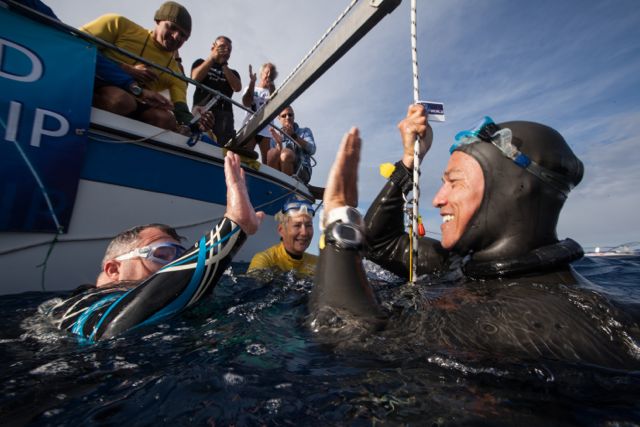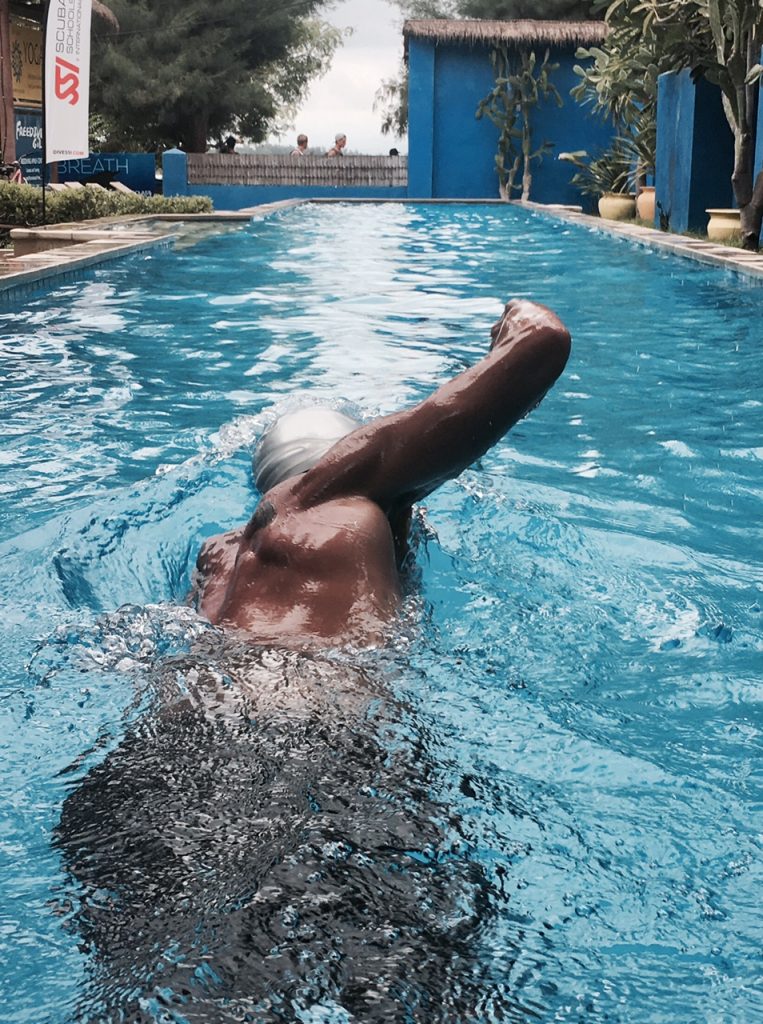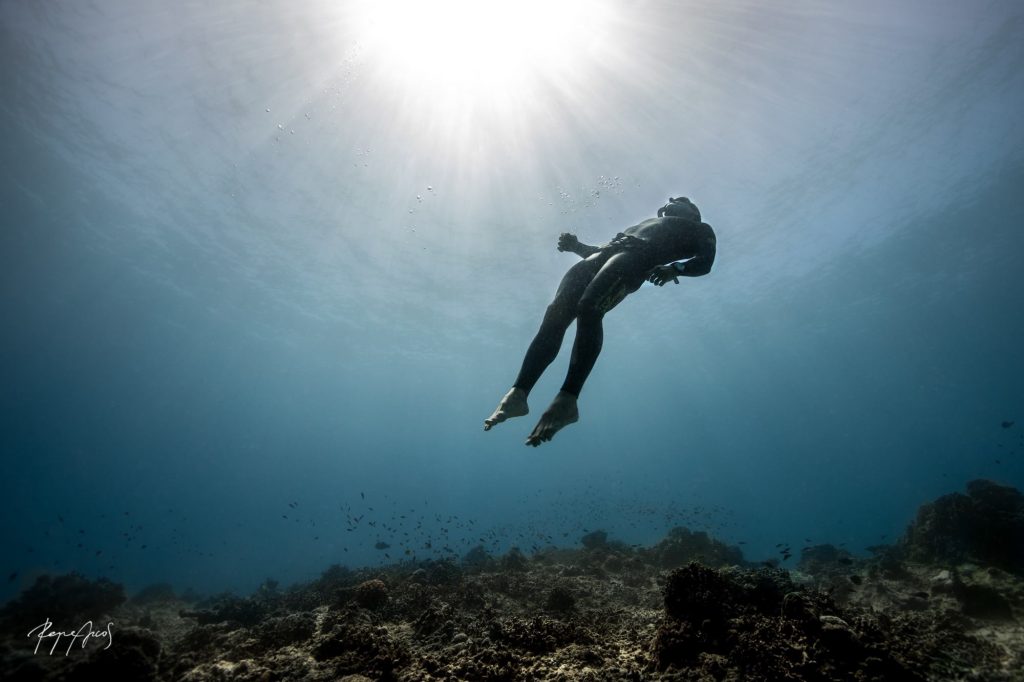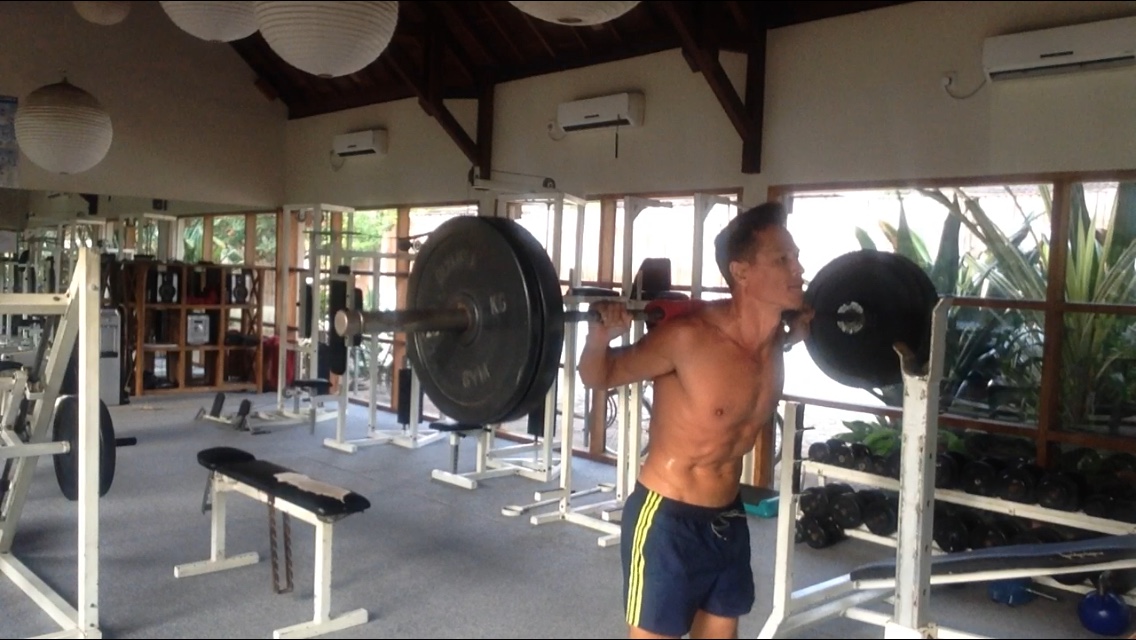Training techniques for deeper freediving

5% deeper!: My three tips for focusing training for freediving deeper
by Michael Board
I am writing this as much for myself as for anyone else to order my thoughts on what went right for me in this year’s Vertical Blue competition compared to my last two years of competitive freediving. My last personal best in competition was November 2014 when I did 103m in Constant Weight. The following year at the AIDA World Championships 2015 in Cyprus I managed to match this depth in training but had an LMC going for the same depth in the actual competition. So basically – no progress, perhaps even a regression. I then tried again to compete in 2016 at Vertical Blue and ended up rupturing my ear drum in training, not for the first time, before the competition even started whilst trying to just dive back down to the same depths. So, the last two years I tried and failed to progress in depth and this forced me to rethink my approach to freediving training.
This year I managed to dive to 108m in competition, clean and able to do more. That’s a 5% increase in performance. What do I put this down to? What 3 things did I do differently in preparation this time compared to previous years?
- Pool Training
- Meditation
- Squats
(not in any order of priority!)
It’s obviously more complexed then this but these are the three KEY elements that I changed, and many other changes probably resulted from this, because as we all know, everything is connected!
So, you can see that none of this sounds like ground breaking new techniques, or the secret that will get everyone diving deeper, but I will try and explain my experience and maybe it will help direct other people’s training in some useful way.
POOL TRAINING

In Freediving, I have always focused more on depth and not spent much time doing the pool disciplines. However, focusing only on depth may have got me so far, maybe to around the 100m depth mark, but then I found that whether it was 100m or a few meters more I would generally be at or near my O2 limit on the surface at the end of a dive.
Just training depth makes it hard to follow progressive training principles as you would normally do when training in a sport as It is generally not good practice to dive close to your O2 limits and do many repeat dives to depth. Plus, there is a DCS risk too.
However, pool freedivers regularly push themselves to their O2 and CO2 limits during training, diving with limited recovery times, and at high levels of discomfort! The results are clear when you see the progress that pool freedivers have been making – hard training works. You can train hard and you can train regularly like an athlete, 5 to 6 times a week.
I did two training cycles leading up to Vertical Blue, guided by Goran Colak who had fortunately for me started to offer coaching at exactly the time that I had my revelation about pool training. The first 8-week cycle before Christmas was exclusively pool training with no depth training, just to get used to the training sessions, the intensity and techniques and start conditioning the body and learn to recover. The second cycle was 10 weeks from after Christmas until leaving for Vertical Blue. This was also mainly pool training with just one or two depth sessions per week.
The final phase was in the Bahamas before Vertical Blue and was 3 weeks of just depth training.
Arriving at Vertical Blue I found that I was physically the most dive-fit I have ever been. Of course, this meant that I had the physical ability to dive deeper, but it also gave me the mental strength to do the dives I wanted to do. As many of us have noticed in freediving everything is interconnected. To dive deep and to be able to equalise deep we need to be relaxed; to be relaxed we need to believe that we can do the dive, to be mentally strong; and by knowing that we are physically prepared we get this mental strength. And so, whereas in previous years I struggled a lot with equalisation, and even ruptured my ears trying to dive deeper, and thought the problem was ‘technical’, in fact by training in the pool I indirectly may have found the way to deeper equalisation.
MEDITATION

Despite all the links drawn between freediving and yoga I have never really recognised the usefulness of meditation in freediving (or just in daily life for that matter) until now! I had never really tried a regular meditative practice and could not really guess at the benefits, but I do not think you can foresee the benefits without just getting started, doing it for a week or two and seeing what happens. It’s kind of surprising even to sceptics!
There are so many ways to meditate so I will just outline what I did and where I think it benefitted me in freediving.
I started simply by committing to 10 mins of sitting silent and still in a comfortable seated position, cross-legged on the floor. The idea is simply to experience the present moment and not try to still the mind. I think of experiencing the present by using my senses to detect the different layers of sensory perception. I use hearing first, casting my attention to the furthest sound I can hear, then gradually bring my attention in closer, identifying the different layers of sound, until I am listening to the nearest sounds, maybe the wind in my ears, or the sound of myself breathing. I bring my attention to touch and physical feeling and notice what I am feeling, and try and notice every sensation, from tension in my body, pain, discomfort, to the wind on my face or skin, and then I focus on sight, but my eyes are closed, so mainly I notice the colours behind my eye lids, sometimes swirling sometimes pulsing, always moving and changing. In this way, I can become very focused in the present moment. Of course, the mind often wants to stray and start thinking of things, sometimes you don’t notice that you have started thinking of something else and you must bring the focus back to your senses again. It’s a continual process but it does not matter if the mind strays as the exercise is to learn to notice and bring the focus back to the present. After a few sessions 10 mins does not feel long enough and you want to do 15 mins and then 20 mins, and these moments of peace and escape from a busy mind become almost like a high!
Ok sounds great, but how does this help freediving 🙂
My observation is it helped me in the following ways:
- Managing pre-dive stress/ competition nerves. The meditation process gave me a firmly reinforced reference for how I want to feel before a dive. When waiting for my official top I would take my mind through the same process, focusing on different layers of sound, touch, feeling and sight, and find myself achieving the same level of relaxation before a dive. This reminded me of Alexey and Natalia’s de-concentration technique, but can also be a form of mental programming as defined by sport psychology guru Lanny Basham.
- Daily meditation quietens the mind in general making it easy to switch in to a focused state. When I first started with my meditation my mind often stayed more busy then focused on my senses. Then I found that with more practices I became more aware of my thoughts wandering and quicker at focusing my attention back to the present moment each time. Some days are better than others of course, but the general pattern was one of improvement, and more quickly being able to restore focus. I think when we freedive we use this same skill. We need to be able to quickly focus our mind on the present, notice quickly when the mind wanders, and then be able to quickly re-focus it. Of course, we all know this theoretically, but how do we train this?I noticed that daily meditation is training exactly this skill.
- I found myself a lot calmer in general despite the rollercoaster of highs, lows and anxiety that most athletes go through during a long competition like the 11 days of Vertical Blue. The short morning meditation sessions meant that at least once per day the mind was released from trying to solve multiple problems at once and this helped to reset things and make me better able to see things clearly.
SQUATS!

I have always enjoyed resistance training, and this has normally included squats as they are surely the king of all exercises! However, I would normally favour doing low reps, heavy weights, to increase strength and power. Under Goran Colak’s guidance the emphasis switched to high reps – air squats, low weights, long set durations of as many reps as possible for 1 min, 2 mins or even 3 mins!
Michael Board has set 15 British national records and is the current National Record holder for Constant Weight (108m) and Free Immersion (100m).
Photo credits
Title photo by Daan Verhoeven
and ‘underwater meditation’ photo by Pepe Arcos

